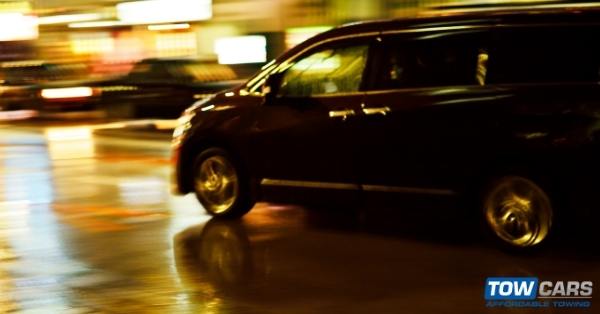Hydroplaning is when your tires lose all contact with the road. It happens when the water builds up between the tire and the road. Speed and sudden braking are often contributors to hydroplaning accidents. Water can build up on your tires without you even noticing, visually.
As the temperature cools, we often experience more rain and wet roads. While this can be a great time of year, it can also cause some issues with hydroplaning that can lead to potentially dangerous conditions. So if you’re planning on driving this month, or have been in any kind of accident due to wet road conditions.
What Is Hydroplaning?
Hydroplaning occurs when your car slides across a wet surface, losing traction with the road. The tires can no longer connect with the road, causing your vehicle to lose control and skid. Hydroplaning can happen on as little as 1/12 of an inch of water.
When you’re driving through rain or snow, it’s vital to be very aware of your surroundings and take preventive actions to prevent hydroplaning from happening. If you’re driving on a slick or wet road surface, do not use cruise control and keep a safe distance between other vehicles. If you feel your vehicle hydroplane, ease up on the gas pedal and gently turn into the direction of the skid until you regain control.
Be Aware Of Road Conditions
Most people have experienced the sensation at one time or another. You’re driving along in your car, and suddenly your vehicle has a mind of its own. You feel like you’re going to spin out of control or even crash. You may be hydroplaning, a common term for when your tires lose traction with the road because they are riding on a thin layer of water. Hydroplaning can lead to loss of control and accidents and is most likely to happen in wet conditions.
Although it can happen anytime, hydroplaning is more common in the spring when temperatures are warmer, and rain is frequent. During winter, it can also occur when standing water on roadways freeze over when temperatures dip below freezing. Before you go for a drive, check the weather report. If it says snow or ice, it’s probably a good idea to stay at home unless you have to go out. If you need to leave your house, make sure to check the temperature and the road conditions before you go.
Drive Slowly In Hazardous Conditions
Drive slowly, especially when approaching areas where there’s standing water. If you drive too fast and start hydroplaning, it’s easy to lose control of your car. Driving slowly can also help avoid other common winter dangers, such as skidding on icy roads and slide-offs into ditches and other obstacles.
Proper Tire Maintenance
Make sure your tires are correctly inflated for the season. If you live in a cold climate, air expands as temperatures drop, so overinflated tires can fail or blow out when it gets colder outside. Light truck tires should be inflated ten psi higher than car tires because they carry heavier loads. Look for uneven wear patterns that may indicate improper alignment or suspension issues.
Never Slam On The Brakes
If something unexpected happens when driving on snow-covered roads — such as an animal running across the street — avoid braking suddenly as this could cause your car to skid out of control. Instead, take your foot off the gas pedal and slowly apply pressure to the brake pedal until you’re able to make a controlled stop in a safe location away from the roadway.
Avoid Cruise Control On Wet Roads
One of the most dangerous things you can do while driving in the rain is cruise control. Cruise control is a feature of your car that automatically keeps your vehicle at a set speed that you have selected. It does this by using a speed sensor on your wheel to monitor the speed and then applying the throttle as needed to keep you going at that speed. If one or more of your tires loses traction with the road while cruise control is engaged, it can cause your vehicle to accelerate – which could be dangerous (or even deadly).
Avoid Pools of Water
You may not be able to see how deep a puddle is until it’s too late. In addition to wet roads, hidden puddles can cause your vehicle to hydroplane. If you come across a pool of water, slow down before entering and drive straight through at a steady speed.
It Happens…
If you do hydroplane, don’t panic. Stay calm, keep your foot off the brake and try to steer straight until your car is back under control. If you can’t get moving again or are concerned about your safety, call a tow company like Tow Cars. We will send out someone who knows how to handle these situations with care.
You’ve done everything you can to avoid hydroplaning, but it still can happen and when it does…
- Move your vehicle to a safe location — if you are able.
- If you can’t move your vehicle to a safe location, move yourself to a safe location.
- Call the proper authorities and a towing company.
Need A Tow?
Tow Cars is available to provide you with roadside assistance in any situation or vehicle emergency. We offer a wide array of services to all of our motorist customers, including car towing and emergency roadside service. Tow Cars Service provides emergency towing in Melbourne area, and our “on-call” fleet of tow trucks and service vehicles guarantee a prompt response. When wintery roadside conditions or physical impairment prevent you from changing your own tire or doing what is needed to fix your vehicle, our emergency roadside assistance gets you back on the road quickly.
Our Services
- Car Towing
- Van Towing
- Truck Towing
- Emergency Towing
- 24/7 Towing
- Motorcycle Towing
- Cheap Towing
- Old Car Removal
- Junk Car Removal
- Roadside Assistance
- Boat Towing
- Bus Towing
- Clearway Towing
- Accident Towing
- Caravan Towing
- Trailers Towing
- Parking Towing
- 4WD Towing
- Limousine Towing
- Commercial Towing
Give us a call right now! – Click on the number if you are on a mobile (03) 4118 9475
Tow car service is very close to Carrum, please check below map.
Tow Cars – 24/7 Tow Truck Service – Emergency Towing Melbourne
- Keysborough - 170 Chapel Rd, Keysborough VIC 3173
- Derrimut - 24 Maxwelton Circuit, Derrimut VIC 3030
- Broadmeadows - 5 Holberry St, Broadmeadows VIC 3047
- Hallam - 4/37-41 Hallam S Rd, Hallam VIC 3803


Recent Comments